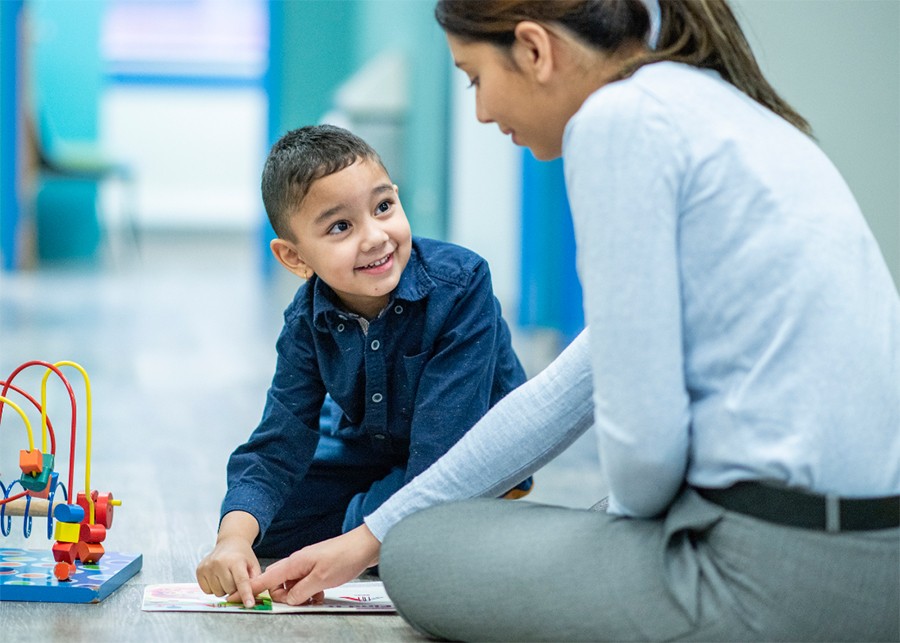
Child & Adolescent Mental Health Services
Are you concerned about your child and wondering if The Nord Center can help? Please call us either if you know you would like to make an appointment or if you aren’t sure. We can discuss the situation with you and we can help you figure out next steps.
Nord Center services don’t have to be “bundled.” If you child has an existing counselor but also needs medication, for example, we can see your child only for the services they need.
You do not need to call in advance for your child to begin services at The Nord Center. Beginning February 1, 2022 we are offering Same Day Access for assessments, which means you may walk in for an assessment with your child during our Same Day Access hours: Mondays through Thursdays anytime from 8AM to 2PM Fridays from 8AM to 1PM at our main office at 6140 South Broadway, Lorain. Plan to be here for around 2 hours.
If your school-aged child is struggling to adapt to the challenges of school and / or home and is exhibiting any of the following symptoms, please contact us:
- Threats of self-harming self or harming others
- Persistent feelings of sadness or hopelessness
- Persistent irritability
- Withdrawn behavior


Need help for your child? You can now walk in for an initial assessment.
Programs & Services
The following options are available through The Nord Center and may be incorporated into your child or adolescent’s individualized service plan:
- Dialectical Behavioral Therapy
- Family Counseling/ Family Systems Approach
- Group Counseling
- Individual Counseling
- Intensive Home-Based Treatment
- Play Therapy (not currently available)
- Problematic Sexualized Behavior, Assessment and Treatment
- Psychiatric Care
- Therapeutic Behavioral Services (not currently available)
- Trauma-Focused Cognitive Behavior Therapy

The following groups are available for active clients:
- Anger Management Group
(Tuesday evenings from 5:00 pm-6:00 pm) - Dialectical Behavioral Therapy (DBT) Group
(Wednesday evenings from 5:00 pm-6:30 pm) - Problematic Sexual Behavior, Assessment & Treatment
Our Team
Our Child & Adolescent Team is made up of:
- Licensed Counselors
- Case Manager
- Pediatric Nurse
- Child Psychiatrist
- Interpreter available for Spanish and other languages

Description of Services
These service descriptions can help you to learn more about what types of treatment is available at The Nord Center. Our trained staff can guide you and your child as to what services would be most helpful and appropriate.
DBT is an evidence-based therapy that has proven to be very effective for high-risk adolescents who are struggling with emotion regulation and related problems, including suicidal ideation, self-harm, depression and anxiety, anger, disorganized thoughts, relationship problems, oppositional and impulsive behavior.
Through weekly individual, family and/or group therapy and coaching our DBT program helps participants:
- learn crisis procedures to assist the child and family in reducing the likelihood of hospitalization
- become more mindful of their feelings, thoughts and behaviors
- regulate their emotions and become more resilient
- manage distress and decrease impulse control
- improve relationships and self-respect
- balance acceptance and change
In addition to the work that can be done one on one by an individual client and therapist there are times when instead making the pattern interactions of the family unit the focus of therapy can be beneficial. This is particularly true when family members agree that what’s happening is not useful, productive or pleasant but don’t know how to move from how they are behaving to new and different ways of behaving. The support of a caring but neutral therapist can be extremely helpful in these circumstances. With the support of the therapist and guidance in communicating about what is happening in the family and what the family would like to see happening participants can begin to plant and nurture the seeds of change.
Some treatment programs at The Nord Center are offered in groups in cases where the group participants are struggling with similar issues and may benefit from hearing about the experiences of others, learning from and supporting each other with the guidance of a trained group leader. Groups may be utilized for issues such as anger management, self-harming behavior or problematic sexual behavior.
Individual counseling is sometimes called “therapy” or “psychotherapy.” It is a process in which a trained clinician meets with a child or adolescent in one on one sessions. Typically the interaction between the client and therapist provide a safe space where it is okay for children to share things that may be on their minds or more frequently, through a process of discovery, helps children to begin to identify and understand what’s behind fears, worries, concern or anger that may itself be causing them difficulties. The therapist and client may set goals together to try to help the client move towards them. Therapy is time limited and solution focused. Typically the focus is on practical approaches and gradual steps to better functioning at home and school.
The purpose of Intensive Home-based Treatment (IHBT) is to meet the needs of youth with serious emotional disturbances who, without intervention may likely end up in of out-of-home placement or who are returning home from such placement. The goal of IHBT is to provide the necessary mental health services and supports to enable youth to live in their homes in the least restrictive and most familiar setting possible. IHBT services are offered in the home, school and community. These services focus on the mental health concerns that put the youth at risk, while promoting positive development and healthy family functioning.
IHBT integrates core mental health services (case management, counseling and therapy, mental health assessment and crisis response) into one seamless service. Service is adaptably delivered at times that are convenient for the entire family and is available around the clock.
What Is Play Therapy?
For children, play is a natural activity of learning, exploration, and communication. For those who have experienced some type of trauma—abuse, family problems or social issues—play therapy can be an effective and developmentally-responsive way to express what they may find difficult to put into words.
Play therapy is thought to be one of the most beneficial methods of helping children who are experiencing cognitive, emotional or behavioral challenges. Though the approach may benefit people of all ages, it is specially designed to treat children under 12.
How Does Play Therapy Work?
Play therapy helps to facilitate healing and the development of new patterns of behavior and thinking, enabling children to be more resilient in everyday life. By helping to free them from negative experiences and feelings that block their learning and development, children learn to see their world in a more positive light.
Benefits
Specific benefits children may gain from play therapy include:
- Reduced anxiety about traumatic events
- Improved confidence and a sense of competence
- Better ability to form healthy bonds in relationships
- Improved ability to trust themselves and others
- Enhanced creativity and playfulness
Why Play Therapy?
Play therapy is used to treat problems that are interfering with the child’s normal development. Such difficulties typically be very significant and have been occurring for several months without resolution. Reasons for treatment include temper tantrums; aggressive behavior; difficulties with sleeping or having nightmares; and worries or fears
This type of treatment is also used with children who have experienced sexual or physical abuse, neglect; the loss of a family member; medical illness; physical injury; or any other traumatic experience.
Some sexual play among young children, such as playing doctor or looking at private parts, may be considered normal. However, some sexual behaviors are inappropriate and potentially harmful to children. For example, some children display intrusive, aggressive or coercive sexual behaviors. The Assessment and Treatment Program for Children with Problematic Sexual Behavior (PSB) serves families of children with this issue. This pioneering program is nationally recognized for its success in treating children.
There isn’t one type of child who develops PSB. Both boys and girls can have it. While some of the children displaying this behavior have been sexually abused, many have not. Most children who have been sexually abused do not have PSB.
Research suggests that many factors can contribute to developing PSB including:
- Family sexual patterns
- Exposure to sexual material
- Exposure to family violence
- Physical abuse
- Other non-sexual behavior problems
Help Begins with a Phone Call
Many youngsters with Problematic Sexual Behavior can be helped with outpatient treatment from 12 to 32 weeks. They can live at home and attend school and other activities without jeopardizing the safety of other children. Even better, most of these children do not continue to have sexual behavior problems into adolescence and adolescence and adulthood.
This program is for school-aged children (ages 7 to 12 years) and their caregivers. Behaviors for which children are referred include:
- Repeatedly exposing themselves to others
- Excessive masturbation
- Failure to recognize socially acceptable physical boundaries
- Aggressive sexual acts
Who Can Refer to this Program?
Our assessment and group therapy services are provided without cost to the family.
Contact us if you know a child who may benefit from this program. We accept referrals from:
- Parents and guardians
- Child protective workers
- Mental health, medical, school and other professionals
- Daycare providers
- Office of Juvenile Affairs
- Juvenile Bureau
Group Treatment
The first step is an assessment to determine if the group treatment is a good fit for the child and family. If accepted into the program, children will learn:
- Rules about sexual behavior
- Privacy and boundary rules
- Coping skills and impulse control skills
- Social skills
Caregivers (parents, foster parents, grandparents) also must participate in the program. They will learn:
- To distinguish normal from problematic sexual behaviors in children
- Appropriate responses to children’s sexual behaviors
- Ways to prevent problematic sexual behavior
- Effective responses to other behavioral problems
Children and their caregivers meet at the same time in separate groups once a week in the early evening. Combined sessions occur where children and caregivers can practice new skills. As part of this research study, families may also choose to participate in an evaluation
The Nord Center’s Child and Adolescent Psychiatric Services include two board certified Child/Adolescent Psychiatrists and a Pediatric Nurse. Our Psychiatric team can provide psychiatric evaluations of children up to age 18, as well as medication management for a variety of disorders including behavioral and disruptive disorders. The Nord Center Child and Adolescent department is a multidisciplinary provider of behavioral health services for children and teens and has provided psychiatry services as a component of its continuum of care since 2005.
Therapeutic Behavioral Services is a service that helps not only to coordinate the care a child or adolescent is receiving but also to provide additional support.
The TBS Specialist may make visits to the home, school or see a child in the office. TBS services can assist with coping skills; regulating distress tolerance and helping a child or adolescent to maintain the progress that they are making in therapy. The TBS Specialist can serve as a care coordinator for the client both internally to The Nord Center and externally with other members of the care team. In those cases, the TBS Specialist may coordinate treatment planning with juvenile detention, school or other behavioral health providers to ensure that the child’s care plan best addresses their immediate and short-term needs.
TF-CBT is a therapeutic intervention designed to help children and their parents overcome the negative and often devastating effects of trauma. Traumatic life events that children experience may include child sexual or physical abuse; loss of a loved one; exposure to domestic, school or community violence; serious car accident; house fire; and serious medical procedures, operations or hospitalizations.
TF-CBT is a short-term treatment typically provided in 12 to 16 weekly sessions. Each session is designed to build the therapeutic relationship while providing education, skills, and a safe environment in which to address and process traumatic memories.
Results of treatment include a wide range of progress, such as a decrease in depression, anxiety, behavior problems, shame, and relationship difficulties. Parents also experience a decrease in their own emotional distress and symptoms, as well as improvement in how they can support their children and manage their children’s behavioral difficulties.